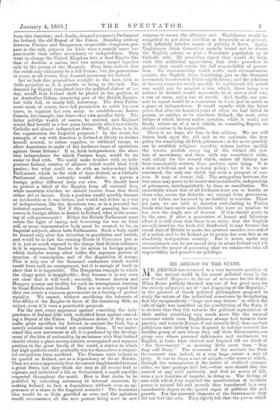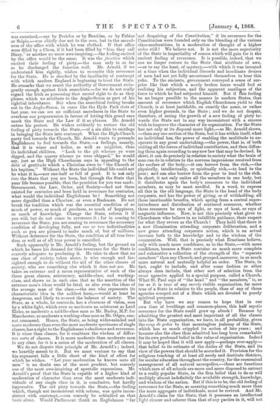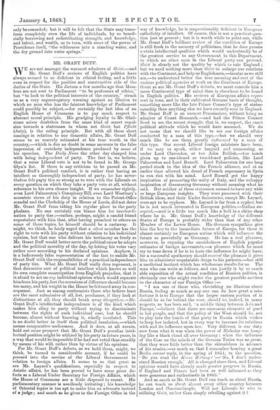MR ARNOLD ON THE STATE.
UR. ARNOLD has returned to a very favourite position of .111. the ancient world in his recent polished essay in the new Cornleill Magazine in favour of reverence for the State. When Rome publicly thanked any one of her great men for the strictly subjective act of " not despairing of the Republic," or the greatest of Greek political philosophers proposed to study the nature of the individual conscience by decyphering first the comparatively " large and easy letters" in which the rule of right was inscribed on the constitution of the State, it is obvious that they felt towards the political organization of their nation something very much more like the natural reverence which even Englishmen always feel towards their parents, and towards Nature, if not towards God, than modern politicians have latterly been disposed to indulge towards the familiar group of men whom they call their Government,—a group over whose personal deficiencies and weaknesses we English, at least, have chatted and laughed till we think of " the Government " as meaning little more than " him they call Dizzy." The reverence of the ancients for their Government was, indeed, to a very large extent a sort of piety. It was to them a sort of miracle,—the sense of which, through the transmission of the habits of civilized commu- nities, we have perhaps half lost,—that men should obey the control of any civil authority, and find an access of life, even a new fountain of impulse, in doing so. The feeling of awe with which they regarded the manifestation of invisible power in natural life and growth they transferred in a very considerable degree to the special organ of political life and growth. For the personal elements of the Government they did not feel this awe. They rightly felt that the power which was exercised,—say by Pericles or by Brasidas, or by Fabius or Scipio,—was chiefly due not to the man, but to the sacred- ness of the office with which he was clothed. If that office were filled by a Cleon, if it had been filled by "him they call Dizzy," or another no more awe-inspiring,—the feeling excited by the office would be the same. It was the function which excited their feeling of piety,—the man only in so far as he discharged the function well. Mr. Arnold, if we understand him rightly, wishes to re-excite this reverence for the State. He is shocked by the familiarity of contempt with which modern England is beginning to treat the State. He remarks that we assert the authority of Government strin- gently enough against Irish anarchists,—for we do not really regard the Irish as possessing that sacred right to do as they please, which we attribute to the Anglo-Saxon as part of his rightful inheritance. But when the anarchical feeling breaks out in the Anglo-Saxon, in cases like the Hyde Park riots of last year, we can see no sufficient sacredness in the State to overbear our prepossession in favour of letting this grand race mock the State and the Law if it so pleases. Mr. Arnold enters his protest. He wishes evidently to restore the old feeling of piety towards the State,—of a sin akin to sacrilege in bringing the State into contempt. What the High-Church party feel towards the Church, Mr. Arnold wants to persuade Englishmen to feel towards the State, —a feelings, namely, that it is wiser and holier, as well as mightier, than its individual children. " Look to the pit whence ye were digged, and the quarry whence ye were chipped," he would say, just as the High Churchman says in appealing to the debt of gratitude which a Christian owes to " the Church of his baptism." Without the State the individual life could not be what it is,—nor one-half so full of good. It is not only into the State that you are born, but through the State that your life became possible, that the provision for you was made. Government, the Law, Order, and Society—had not these existed for centuries and been held in reverence for centuries, what would the individual Englishman be ? Something not more dignified than a Choctaw, or even a Bushman. Do not break the tradition which was the essential condition of so much of power, so much of goodness, so much of happiness, so much of knowledge. Change the State, reform it if you will, but do not cease to reverence it ; for in ceasing to reverence the State, you are ceasing to reverence the necessary condition of developing fully, not one or two individualities such as you are pleased to make much of, but of millions. Without deference for the State, the condition of all true free- dom as well as of all true power is cancelled.
Such apparently is Mr. Arnold's feeling, but the ground on which he bases his demand for this reverence for the State is scarcely adequate to producing it. He tries to show that no one class of society, taken alone, is wise enough and far- sighted enough to do without the aid of the other classes of society, who see something else which it does not see. He takes an extreme and a mean representative of each of the three great classes, aristocracy, middle-class, and working- class, and shows us in each case that as the assertion of the extreme man's ideas would be fatal, so also even the ideas of the average man of the class,—the one who represents its characteristic idea in the mildest form,—would at least be dangerous, and likely to overset the balance of society. The State, as a whole, he contends, has a clearness of vision, sees by a white light, which even so moderate an aristocrat as Lord Elcho, so moderate a middle-class man as Mr. Bazley, M.P. for Manchester, so moderate a working-class man as Mr. Odger, can- not command. Hence, the State, as being wider-minded and more moderate than even the most moderate specimens of single classes, has a right to the Englishman's obedience and reverence. It is wiser than classes, for it combines the wisdom of differ- ent sorts of classes. It is more moderate than moderate men in any class, for it is a union of the moderation of all classes.
We do not dispute this principle of Mr. Arnold's ; indeed, we heartily assent to it. But we must venture to say that his argument falls a little short of the kind of effect for which he wishes. "Let your moderation be known unto all men " is no doubt one of the most prudent, but scarcely one of the most awe-inspiring of apostolic expressions. Mr. Arnold's proof that the State is capable of a higher kind of moderation of character than even the most moderate indi- viduals of any single class in it, is conclusive, but hardly impressive. The old piety towards the State,—the feeling which, though not inconsistent with reform, was quite incon- sistent with contempt,—can scarcely be rekindled on that basis alone. Would Parliament thank an Englishman " for not despairing of the Constitution," if its reverence for the Constitution were founded only on the blending of the various class-moderations, in a moderation of thought of a higher order still? We believe not. It is not the mere superiority of the State in impartiality of reason which will gain for it the ancient feeling of reverence. It is possible, indeed, that we can no longer restore to the State that attribute of awe, —or to say the least, of mystery,—with which it was invested at a time when the individual discords and inordinate desires of men had not yet fully accustomed themselves to bear this yoke. To the ancients, government conveyed a sense of sur- prise like that which a newly broken horse would feel at realizing his subjection, and the apparent sraalliNss of the force to which he had subjected himself. But if this feeling be no longer possible to the masses in modern States, that amount of reverence which English Churchmen yield to the Church, is at least justifiable, on exactly the same, or rather even higher grounds, to the State ; and we do not despair, therefore, of seeing the growth of a new feeling of piety to- wards the State not in any way inconsistent with a sincere wish to improve the character of its organization. For the State has not only at its disposal more light,—as Mr. Arnold shows, —than any one section of the State, but it has within itself, what no individual has, the power of enabling the multitude to co- operate in any great undertaking,—the power, that is, of both uniting all the forces of individual contribution, and then diffus- ing them again according to anynew law that may be devised. In short, it can do precisely in relation to society what the brain of man can do in relation to the nervous impressions received from the surface of the body,--it can borrow from the rich, the physically, intellectually, or spiritually rich,—to lend to the poor; and can also borrow from the poor to lend to the rich. In short, it not only unites all the members in one body, but it distributes again the body's resources to the individual members, as may be most needful. In a word, to express all this in the old language, the State is the head of the body corporate, and has the power of giving, or of withholding, all these inestimable benefits, which spring from a central super- intendence and distribution of scattered resources, whether these resources be rays of light, or rays of heat, or rays of magnetic influence. Now, is not this precisely what gives to Churchmen who believe in no infallible guidance, their respect for what they revere as the Church ? They hold that there is a new illumination attending corporate deliberation, and a new grace attending corporate action, which is an actual increase both to the knowledge and to the wisdom of the communion. Well, that is precisely what Erastians believe, only with much more confidence, as to the State,—with more confidence, because a State contains so much more complete and exhaustive a collection of the strength of the " separate members" than any Church, and grouped, moreover, in so much more natural and mutually helpful an order. The State, in fact, ought to include, and after some fashion or other always does include, that other sort of selection from the same agencies applied to a special purpose, called a Church. What St. Paul says of " the head " and "the members," is, so far as it is true of any merely visible organization, far more true of a State in relation to the people, than of any of those agencies scooped out of a State which are devoted to purely spiritual purposes.
But why have we any reason to hope that in our own time of levellings and common-places, this half mystic reverence for the State could grow up afresh ? Because by admitting the greatest and most important of all the classes into the State organization, we have, in all probability, given the coup de griice to that meaningless jealousy of the State, which has so much crippled its action of late years ; and because also the class thus admitted has long been remarkable for its own profound belief in the value of organization. Indeed it may be hoped that it will now apply—perhaps over-apply- that belief to its estimate of the duties of the State, and its view of the powers that should be accorded it. Provision for the religious teaching of at least all needy and destitute districts, for secular education throughout the country, for the economical management of all natural monopolies,—these are functions which men of all schools are more and more disposed to entrust to a really popular State, in the firm belief that to do so will multiply almost indefinitely the available strength, knowledge, and wisdom of the nation. But if this is to be, the old feeling of reverence for the State, as meaning something much more than the mere aggregate of individuals, must be revived. And Mr. Arnold's claim for the State, that it possesses an intellectual light clearer and soberer than that of any parties in it, will not only be conceded; but it will be felt that the State may trans- form completely even the life of individuals, by so benefi- cially borrowing and redistributing strength, and knowledge, and talent, and wealth, as to turn, with some of the power of Providence itself, "the wilderness into a standing water, and the dry ground into water springs."










































 Previous page
Previous page